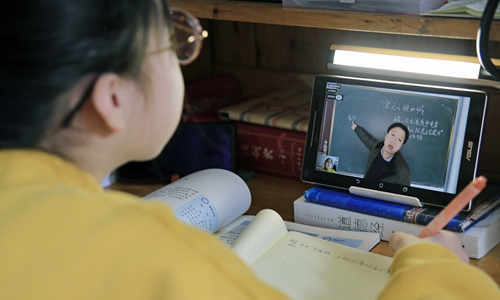SOURCE / INDUSTRIES
Chinese live-streaming platforms facilitate remote learning for students in Wuhan

A student takes an online course at home in Yuncheng, North China's Shanxi Province during the coronavirus outbreak. Photo: IC
More than 900,000 students in primary and secondary schools in Wuhan, epicenter of the novel coronavirus (COVID-19) outbreak, have begun taking remote classes through an online platform supported by Chinese live-streaming company Douyu.More live-streaming and short video platforms have joined in to provide remote teaching services for Chinese students, with education experts saying the frenzy reflects Chinese internet companies' ambitions and their preparedness to fulfill social responsibility too.
Wuhan-based Douyu has been adding more than 3,000 live-streaming "rooms" daily on its online education section, with users' online traffic soaring seven times from early January, the People's Daily reported.
In order to reduce the impact of the coronavirus outbreak on students' studies, the Wuhan Education Bureau on February 10 established an online platform to provide 500 to 600 courses every morning. The platform's daily viewers hit 1 million and unique page views surpassed 10 million.
However, students and parents across China have been reporting problems including slow or lost internet connections and blurred images.
The Wuhan Education Bureau has noticed such issues and solved the problems with the help of Douyu. Its technical skills based on a large number of viewers can help solve loading problems on the bureau's education platform so that students can open the webpage in one second, local media reported.
Live-streaming platforms such as Huya, Bilibili and short video platforms Douyin and Kuaishou have also provided online courses for users in recent days.
"It is necessary for these internet platforms to enter the educational sector at present, because they are good at providing broadband services with large servers … while traditional education services can provide good quality education," Liu Dingding, a Beijing-based independent industry analyst, told the Global Times on Thursday.
He noted Chinese internet companies have experience from "Double 11" shopping spree to deal with mass flows of viewers, hence the large number of student users amid the outbreak period has not posed difficulties for them.
Liu also said the live-streaming and short video platforms have long been eyeing the online education business and will maintain such operations after the virus is contained.
According to a report released by Douyin last September, the number of professional user-generated education videos surpassed 450,000 last June, and cultural and educational users grew 330 percent in six months. In 2019, 200 million short videos on Kuaishou were education-oriented, with daily views surpassing 2.2 billion.
A mother surnamed Sun in Beijing told the Global Times her 8-year-old daughter loves online learning and finds it novel, like playing a game.

